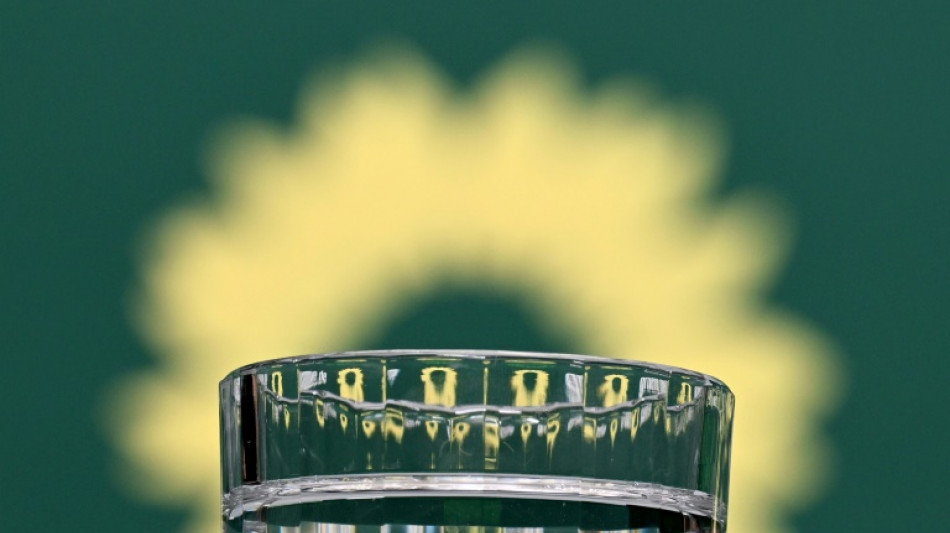
-
 Dutch PM-elect Jetten says not yet time to talk to Putin
Dutch PM-elect Jetten says not yet time to talk to Putin
-
Social media fuels surge in UK men seeking testosterone jabs

-
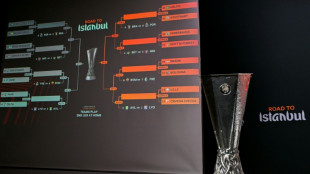 Forest face Fenerbahce, Celtic draw Stuttgart in Europa League play-offs
Forest face Fenerbahce, Celtic draw Stuttgart in Europa League play-offs
-
US speed queen Vonn crashes at Crans-Montana, one week before Olympics

-
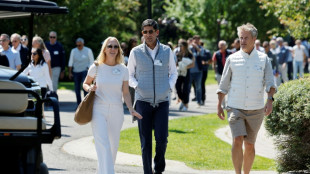 Trump nominates former US Fed official as next central bank chief
Trump nominates former US Fed official as next central bank chief
-
New Dutch government pledges ongoing Ukraine support

-
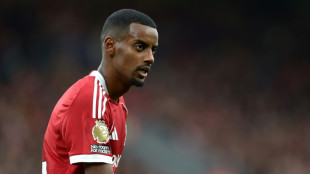 Newcastle still coping with fallout from Isak exit, says Howe
Newcastle still coping with fallout from Isak exit, says Howe
-
Chad, France eye economic cooperation as they reset strained ties
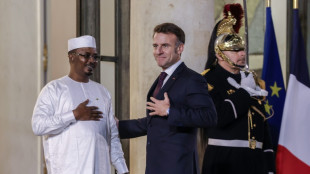
-
 Real Madrid to play Benfica, PSG face Monaco in Champions League play-offs
Real Madrid to play Benfica, PSG face Monaco in Champions League play-offs
-
Everton winger Grealish set to miss rest of season in World Cup blow

-
 Trump brands Minneapolis nurse killed by federal agents an 'agitator'
Trump brands Minneapolis nurse killed by federal agents an 'agitator'
-
Arteta focuses on the positives despite Arsenal stumble

-
 Fijian Drua sign France international back Vakatawa
Fijian Drua sign France international back Vakatawa
-
Kevin Warsh, a former Fed 'hawk' now in tune with Trump

-
 Zverev rails at Alcaraz timeout in 'one of the best battles ever'
Zverev rails at Alcaraz timeout in 'one of the best battles ever'
-
Turkey leads Iran diplomatic push as Trump softens strike threat

-
 Zelensky backs energy ceasefire, Russia bombs Ukraine despite Trump intervention
Zelensky backs energy ceasefire, Russia bombs Ukraine despite Trump intervention
-
'Superman' Li Ka-shing, Hong Kong billionaire behind Panama ports deal

-
 Skiing great Lindsey Vonn crashes at Crans-Montana, one week before Olympics
Skiing great Lindsey Vonn crashes at Crans-Montana, one week before Olympics
-
Slot warns Liverpool 'can't afford mistakes' in top-four scrap

-
 Paris show by late Martin Parr views his photos through political lens
Paris show by late Martin Parr views his photos through political lens
-
Artist chains up thrashing robot dog to expose AI fears

-
 Alcaraz outlasts Zverev in epic to reach maiden Australian Open final
Alcaraz outlasts Zverev in epic to reach maiden Australian Open final
-
French PM forces final budget through parliament

-
 French-Nigerian artists team up to craft future hits
French-Nigerian artists team up to craft future hits
-
Dutch watchdog launches Roblox probe over 'risks to children'

-
 Trump brands Minneapolis nurse shot dead by federal agents an 'agitator'
Trump brands Minneapolis nurse shot dead by federal agents an 'agitator'
-
Israel says killed 'three terrorists' in Gaza

-
 After Trump-fueled brawls, Canada-US renew Olympic hockey rivalry
After Trump-fueled brawls, Canada-US renew Olympic hockey rivalry
-
Eileen Gu - Olympic champion who bestrides rivals US, China

-
 Trump, first lady attend premier of multimillion-dollar 'Melania' documentary
Trump, first lady attend premier of multimillion-dollar 'Melania' documentary
-
US Senate eyes funding deal vote as government shutdown looms

-
 Cuddly Olympics mascot facing life or death struggle in the wild
Cuddly Olympics mascot facing life or death struggle in the wild
-
UK schoolgirl game character Amelia co-opted by far-right

-
 Anger as bid to ramp up Malaysia's football fortunes backfires
Anger as bid to ramp up Malaysia's football fortunes backfires
-
Panama court annuls Hong Kong firm's canal port concession

-
 Pioneer African Olympic skier returns to Sarajevo slopes for documentary
Pioneer African Olympic skier returns to Sarajevo slopes for documentary
-
Trump threatens tariffs on nations selling oil to Cuba

-
 From fragile youngster to dominant star, Sabalenka chases more glory
From fragile youngster to dominant star, Sabalenka chases more glory
-
Lowly Montauban 'not dead' in French Top 14 survival hunt

-
 'Winter signing' Musiala returns to boost weary Bayern
'Winter signing' Musiala returns to boost weary Bayern
-
Elena Rybakina: Kazakhstan's ice-cool Moscow-born Melbourne finalist

-
 Power battle as Sabalenka clashes with Rybakina for Melbourne title
Power battle as Sabalenka clashes with Rybakina for Melbourne title
-
Contrasting fortunes add Basque derby edge for Matarazzo's revived Sociedad

-
 Asian stocks hit by fresh tech fears as gold retreats from peak
Asian stocks hit by fresh tech fears as gold retreats from peak
-
Kim vows to 'transform' North Korea with building drive

-
 Peers and Gadecki retain Australian Open mixed-doubles crown
Peers and Gadecki retain Australian Open mixed-doubles crown
-
Britain's Starmer seeks to bolster China ties despite Trump warning

-
 Kaori Sakamoto - Japan skating's big sister eyes Olympic gold at last
Kaori Sakamoto - Japan skating's big sister eyes Olympic gold at last
-
Heavy metal: soaring gold price a crushing weight in Vietnam


Green parties suffer EU poll drubbing
Green parties suffered major losses in the EU elections, particularly in France and Germany, hit by growing discontent at the bloc's environmental push and by voters' shifting priorities.
They had notched up their best ever results at the last European Parliament polls five years ago, which were accompanied by mass rallies over climate change.
But the parties appeared to be the biggest losers of this year's election, with projections showing they will be left with just 53 seats in the parliament -- down from a record 72 in 2019.
The German Greens -- part of Chancellor Olaf Scholz's beleaguered ruling coalition -- saw their support slide to just 12 percent compared with 20.5 percent in 2019, according to preliminary results.
France's main Green party, EELV, meanwhile won just five percent of the vote, down from over 13 percent, the results showed.
The party's leading candidate, EU lawmaker Marie Toussaint, conceded she was "unable to convince people beyond our base".
Toussaint said that she had underestimated "the strength of lobbying and the cultural battle that is constantly being waged against us".
There were however pockets of good news for pro-environment parties -- they made gains in Sweden while a Green/Labour alliance came out on top in the Netherlands, edging out the far right.
- Changing priorities -
The loss of support comes against a backdrop of changing priorities for EU voters.
Environmental issues have slipped down the agenda with voters now focused on issues such as the EU's struggling economy, following a bout of record inflation, and security, with wars raging in Ukraine and the Middle East.
There have also been signs of growing frustration among voters at the cost of green transition measures, such as switching to electric vehicles and overhauling heating systems.
"Climate protection has slipped down people's list of priorities, even among young people," said German news outlet Spiegel, seeking to explain the losses suffered by the country's Greens.
"War, and a longing for peace, are much more important, as are social issues, crime and immigration."
After their gains in the 2019 EU polls, Green parties had helped to push through a mammoth package of "Green Deal" laws as warnings about the dire impact of climate change multiplied.
But far-right parties, who made strong gains at the EU polls, seized on discontent at the policies.
Some analysts say the centre-right European People's Party (EPP) -- which came out on top in the election and remains the biggest grouping in the EU parliament -- has sought to discredit the green agenda.
After watering down or rejecting several green laws over the past year, the EPP has been openly calling for a "pause" on any more such legislation to concentrate on keeping the EU economy competitive.
Most prominent in the pushback against the EU's environmental law has been a wave of farmer protests across the bloc, fuelled by ire at regulations perceived as excessive.
- Coalition pains -
Some Green parties have lost support after agreeing to concessions to join a coalition government, only to end up angering their base.
In Germany for example, the Greens accepted the reopening of coal power plants in the wake of Russia's invasion of Ukraine, as well as a delay to the shutdown of the country's last nuclear plants.
But they have also sparked a backlash by championing climate policies such as a law to reduce emissions from heating systems, which critics said would force homeowners to fit costly heat pumps.
German far-right party AfD, which made gains at the EU polls, has been among those seizing on the anger to help bolster its own support.
In France, Sandrine Rousseau, an EELV lawmaker for Paris, expressed regret that the party had not agreed to join a left-wing alliance for the polls, preferring instead to go it alone.
Voters had "held it against" them, she said.
burs-sr/fec/rlp
N.Schaad--VB



